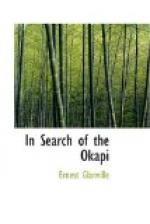The Okapi rocked and heaved, was lifted at the bows to fall back with a splash.
“Hippo,” gasped Venning, making a drive with his weapon through the mosquito curtains. “Got him!—no!—missed!”
“What’s that you’ve got there, Venning?”
“Sort of harpoon.”
“By gum!” said Mr. Hume, taking the weapon, “I’m glad you missed the beggar. I would not give much for our chances if he turned crusty in this place.”
The hippo reappeared aft with a snort, and, much to their relief, continued down the channel into the wider waters.
“Find the watch pleasant?” asked Compton, sleepily, as Mr. Hume turned in.
“Awfully cheerful,” said Venning, earnestly; “but I’m not selfish, and you can take your turn at it on the tick of the hour.”
Compton dived for his rugs, and Venning once more returned to his duties with his harpoon over his knees, and a string of winged visitors entering joyously by the hole he had made in the curtain. He pinned his handkerchief over the rent to stop further free entrance, then made war on those which had entered—an amusement which carried him well into the fourth and last hour of the first watch. Then he sat up to listen for the old sounds—the groans and the snorts—but they had ceased. A mist, like a wet blanket, had settled down over the Okapi, over the islands and the river; and, though any sounds made on the water were startlingly distinct, confined as the sound-waves were by the mist, the creatures had evidently gone to sleep. There was, however, one visitor faithful to him. The light of the lantern, which showed the rolling wreaths of the mist, just reached the water, and in the reflection he saw two greenish points. After long looking, he made out that these were the eyes of a crocodile, whose body was half in and half out of the water, the tail end of him being anchored on the little island. At eleven o’clock he roused Compton by dragging at his ankle.
Compton sat up, rubbed his eyes, and drew his rug over his shoulders.
“What’s the countersign, comrade?” he asked, with a yawn.
“Countersign?”
“Yes; when the watch is relieved he has to say something or other, as a guide to the new man.”
“Oh, I see. Well, let me introduce you to the companion of your watch. See those green points out there?”
“Yes—like dull glass.”
“That’s your new chum. He’s been there an hour without moving, and it’s no good trying to stare him down.”
“What is it?”
“Crocodile. Good night. Wish you joy;” and Venning crept under his waterproof sheet with a sigh of relief.
Neither of the two boys smoked, taking the advice of Mr. Hume, who persuaded them that tobacco acted as a poison when used too early, and spoiled good hunting. It lowered the action of the heart, affected the hearing and the sense of smell. In place of a pipe, therefore, Compton found comfort in chewing, not tobacco, but a meat lozenge. As he chewed he watched the two little dull green spots, and the crocodile watched him with the deadly patience that so often brings grist to the mill, or, rather, food to his jaws.




